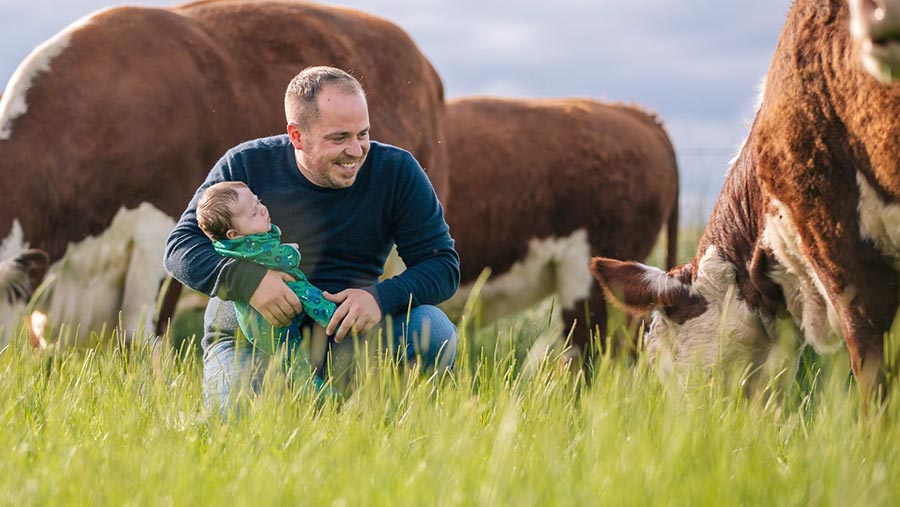Job profile: What’s it like to be a herdsman?
If you like the idea of working with animals in a role with plenty of responsibility, a job as a herdsperson could be perfect for you.
They are responsible for the health and welfare of the cattle under their care, as well as making sure the enterprise meets its targets for growth rates or milk production.
Farmers Weekly talks to Sam Walton, a beef herdsman tending Red Poll cattle, who has a big public-facing component to his role.
See also: Read more job profiles in agriculture

Sam Walton
Tell us about your job
I’ve worked at Tatton Park Farm since 2015. The park – one of Cheshire’s top tourist attractions – is owned by the National Trust, and financed by the council.
I look after a small herd of Red Polls and am heavily involved with educational work, teaching some of the 80,000 visitors a year about agriculture.
People say don’t work with children or animals – I do both!
Herdsperson highs and lows
Pros:
• Sense of satisfaction and pride from working with animals
• Good salaries available for talented, hard-working people
• Showing livestock can be fun and rewarding
• Great camaraderie within livestock sector
Cons:
• Can be very long hours
• Can be physically tough
• Diseases – such as TB – can be devastating for stock and staff
• Career progression sometimes difficult without moving employer/area
What are your responsibilities as a herdsman?
Everything from feeding, bedding up and milking to looking after calves, haymaking and mucking out. I also keep 15 Hereford cattle of my own on a patch of land I rent nearby.
What’s the appeal of working with livestock?
There are cows everywhere you look in Cheshire and I grew up on a family farm near Northwich, so I have always known my career would involve cattle.
I started breeding my own Herefords when I was 12 and, from that moment, I’ve been obsessed with livestock. It’s hard work, but it’s so rewarding seeing new life when animals give birth.
Another highlight was when we won the Red Poll Cattle Society’s Best Small Herd in the UK award in 2017.
A big part of your role is talking to the public, right?
There’s a lot of criticism of livestock farming, so as farmers we have a huge opportunity – and a responsibility – to teach people the facts about food production.
I also present the Saturday morning breakfast show on Cheshire Silk 106.9, so I bring as much farming into that as possible.
Would you recommend going to agricultural college?
Definitely. They’re the best years of your life. I studied for a National Diploma in Agriculture at Reaseheath.
College opens up your mind to different approaches. After I finished the course in 2008, I worked on the college’s dairy unit for six-and-a-half years.
Are good herdspeople born or made?
You need to have an initial enthusiasm to work with livestock – and you’re either born with that desire or you’re not. But if you have that, you can develop the rest.
Being a good stockperson is all about really knowing your animals so well that, when something changes or is wrong, you can immediately spot it. And there Is no better way of getting to know your stock than by spending time with them.
You recently went to New Zealand – tell us about that
I was awarded the John Platt travel scholarship by Reaseheath College and the Cheshire Agricultural Society, so went there to see how farmers are engaging with the public.
It was a fantastic trip and I learned so much. I’d advise anyone to travel if they can. You can earn a bit of money and you’ll bring back loads of ideas.
Are you optimistic about the future for livestock farmers?
Yes. In a world of TB, rising input prices and challenging returns, there can be times when you wonder if it’s worth all the hard work – but it so is. There are many more good days than bad days.
What advice would you give a young person wanting to follow in your footsteps?
There are always obstacles if you want to work with livestock – whether it’s finding the right employer or a lack of money or land if you’re trying to go it alone.
But don’t give up. Opportunities do arise, so you have to be ready when they do. It’s also important not to be so focused on your dream scenario that you miss other opportunities.
Get involved with a breed society, too. The Hereford Cattle Society has been a massive help and support to me.
What are the salaries like?
There’s a shortage of skilled herdsmen and herdswomen so, if you’re good at your job, willing to graft hard and are prepared to move location, there are some great opportunities.
There are some herd managers in their 20s or 30s who earn £30,000-£40,000/year and the very best farm managers on big livestock units can earn £45,000-plus.
Many of these will have started as herdsmen or herdswomen.
